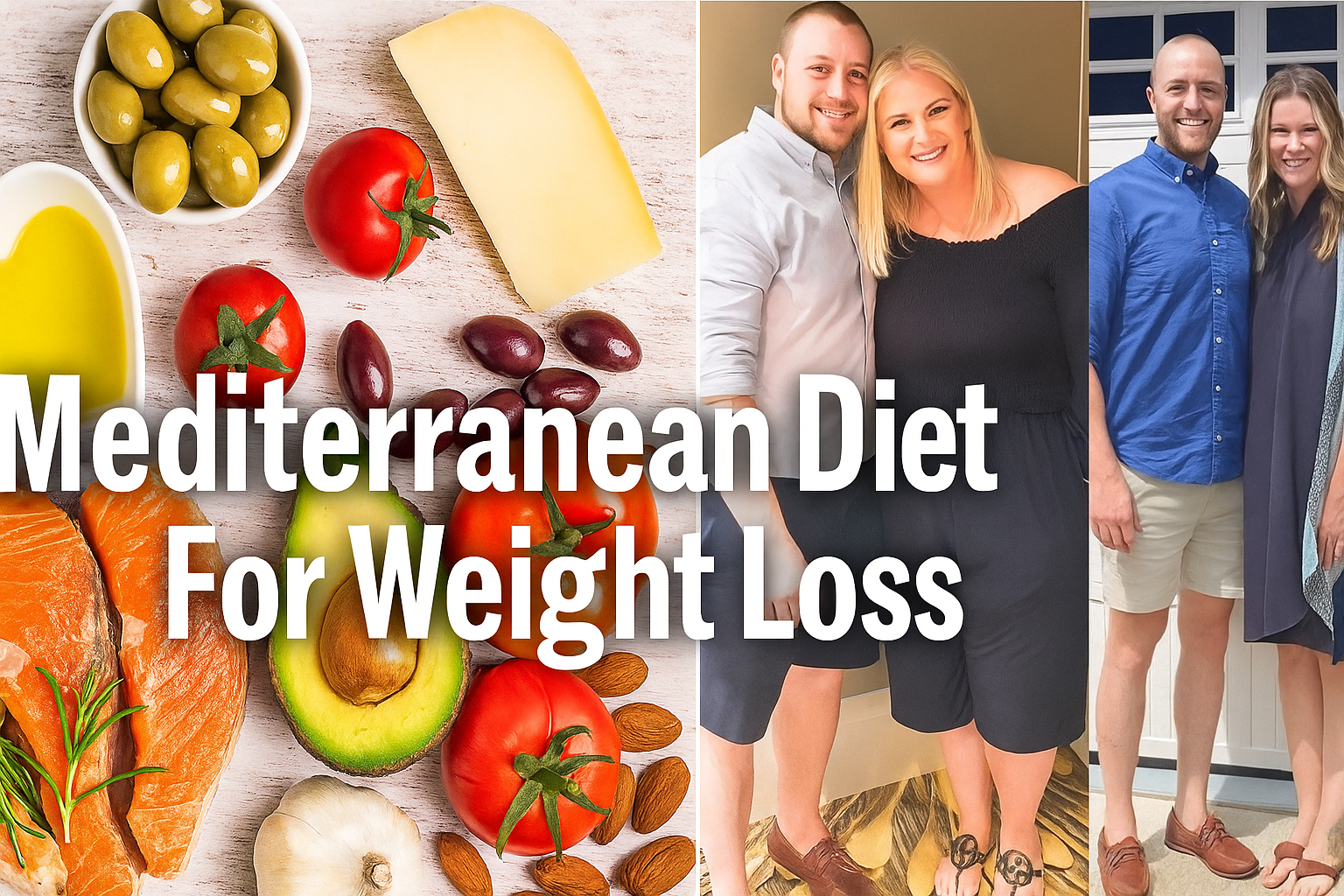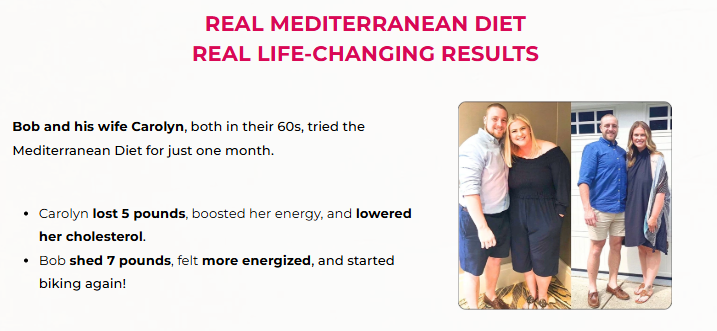The Mediterranean diet has gained widespread popularity for its delicious flavors and numerous health benefits, including its ability to support healthy weight loss. Rooted in the traditional eating patterns of countries bordering the Mediterranean Sea, this diet emphasizes whole, nutrient-rich foods that promote overall well-being while helping individuals achieve and maintain a healthy weight. In this article, we’ll explore how the Mediterranean diet supports weight loss, its key components, and practical tips for incorporating it into your lifestyle.
What Is the Mediterranean Diet?
The Mediterranean diet is a balanced, sustainable eating pattern inspired by the culinary traditions of countries like Greece, Italy, and Spain. It prioritizes:
- Whole, plant-based foods: Fruits, vegetables, whole grains, legumes, nuts, and seeds.
- Healthy fats: Olive oil as the primary fat source, along with moderate amounts of avocados and nuts.
- Lean proteins: Fish, poultry, and occasional red meat.
- Moderate dairy: Greek yogurt, cheese, and other dairy in small amounts.
- Limited processed foods: Minimal consumption of refined sugars, processed meats, and packaged snacks.
- Wine in moderation: Typically red wine, consumed with meals in small amounts.
This diet is not about strict calorie counting or deprivation but focuses on nutrient-dense foods that nourish the body and promote long-term health.
How the Mediterranean Diet Supports Weight Loss?
The Mediterranean diet is effective for weight loss because it combines nutrient-rich foods, balanced macronutrients, and sustainable eating habits. Here’s how it works:
1. Promotes Nutrient-Dense, Low-Calorie Foods
The Mediterranean diet emphasizes fruits, vegetables, and whole grains, which are naturally low in calories but high in fiber, vitamins, and minerals. Fiber-rich foods like legumes, whole grains, and vegetables increase feelings of fullness, reducing the likelihood of overeating. For example, a bowl of lentil soup or a colorful vegetable salad can be both satisfying and low in calories, making it easier to maintain a calorie deficit without feeling deprived.
2. Encourages Healthy Fats
Unlike low-fat diets, the Mediterranean diet embraces healthy fats, particularly from olive oil, nuts, and fatty fish like salmon. These fats are satiating, helping to curb cravings and prevent overeating. Monounsaturated fats in olive oil and omega-3 fatty acids in fish also support heart health and reduce inflammation, which can be beneficial for weight management.
3. Reduces Processed Food Intake
Processed foods, such as sugary snacks, fast food, and refined carbohydrates, are high in empty calories and can lead to weight gain. The Mediterranean diet limits these foods, replacing them with whole, unprocessed options. This shift reduces calorie intake while providing essential nutrients, supporting sustainable weight loss.
4. Supports Balanced Blood Sugar Levels
The Mediterranean diet’s focus on low-glycemic foods, such as whole grains and legumes, helps stabilize blood sugar levels. Stable blood sugar reduces cravings for sugary or high-calorie foods, making it easier to stick to a healthy eating plan. For example, swapping white bread for whole-grain bread or choosing quinoa over refined pasta can help maintain steady energy levels and prevent hunger spikes.
5. Encourages Mindful Eating
The Mediterranean lifestyle emphasizes enjoying meals slowly, often with family or friends, which promotes mindful eating. Eating mindfully helps you recognize hunger and fullness cues, reducing the tendency to overeat. Additionally, the diet’s delicious and varied flavors make it easier to enjoy healthy foods without feeling restricted.
6. Sustainable and Flexible Approach
Unlike restrictive fad diets, the Mediterranean diet is flexible and sustainable, making it easier to stick with long-term. It allows for occasional indulgences, such as a small glass of red wine or a piece of dark chocolate, which reduces feelings of deprivation. This sustainability is key to maintaining weight loss over time.
Scientific Evidence Supporting the Mediterranean Diet for Weight Loss
Numerous studies have demonstrated the Mediterranean diet’s effectiveness for weight loss and overall health. A 2016 study published in The Lancet found that participants following a Mediterranean diet with olive oil or nuts experienced modest weight loss compared to those on a low-fat diet. Additionally, a 2018 meta-analysis in The American Journal of Medicine concluded that the Mediterranean diet is associated with reduced body weight, body mass index (BMI), and waist circumference, particularly when combined with regular physical activity.
The diet’s benefits extend beyond weight loss. It has been linked to a lower risk of heart disease, diabetes, and certain cancers, making it a holistic approach to health.
Key Foods in the Mediterranean Diet for Weight Loss
To maximize weight loss on the Mediterranean diet, focus on incorporating these foods into your meals:
- Fruits and Vegetables: Aim for a variety of colorful produce, such as leafy greens, tomatoes, zucchini, berries, and citrus fruits.
- Whole Grains: Choose quinoa, brown rice, farro, or whole-grain pasta over refined grains.
- Legumes: Beans, lentils, and chickpeas are high in fiber and protein, promoting satiety.
- Healthy Fats: Use extra-virgin olive oil for cooking and dressings, and include nuts and seeds in moderation.
- Lean Proteins: Prioritize fish (e.g., salmon, sardines) and poultry, with red meat as an occasional treat.
- Herbs and Spices: Flavor meals with herbs like basil, oregano, and rosemary to reduce reliance on salt or sugary sauces.
Practical Tips for Following the Mediterranean Diet:
- Plan Your Meals: Create a weekly meal plan with Mediterranean-inspired recipes, such as grilled fish with roasted vegetables or a chickpea and quinoa salad.
- Stock Your Pantry: Keep staples like olive oil, canned beans, whole-grain pasta, and nuts on hand for quick, healthy meals.
- Cook at Home: Preparing meals at home allows you to control ingredients and avoid processed foods.
- Practice Portion Control: While the Mediterranean diet is flexible, portion control is still important for weight loss. Use smaller plates to help manage portions.
- Stay Active: Pair the diet with regular physical activity, such as walking, swimming, or yoga, to boost weight loss and overall health.
- Hydrate: Drink plenty of water and incorporate herbal teas or infused water for variety.
Sample Mediterranean Diet Meal Plan for Weight Loss:
Here’s a one-day sample meal plan to get you started:
- Breakfast: Greek yogurt with fresh berries, a drizzle of honey, and a sprinkle of chia seeds.
- Lunch: Grilled chicken and vegetable wrap with whole-grain pita, hummus, and a side of mixed greens.
- Snack: A handful of almonds and a small apple.
- Dinner: Baked salmon with a lemon-herb sauce, quinoa, and roasted Mediterranean vegetables (zucchini, bell peppers, and eggplant).
- Dessert: A small square of dark chocolate or a fresh fruit salad.
>>>> Access Your Mediterranean Diet Plan Now!
Potential Challenges and How to Overcome Them:
While the Mediterranean diet is highly effective, some challenges may arise:
- Cost of Ingredients: Fresh produce, fish, and olive oil can be expensive. To save money, buy seasonal produce, opt for frozen fish, and purchase staples like beans and grains in bulk.
- Time Constraints: Cooking from scratch can be time-consuming. Batch-cook meals or use a slow cooker for convenient, healthy dishes.
- Social Settings: Dining out or attending social events may tempt you with processed foods. Look for Mediterranean-inspired options, such as grilled seafood or vegetable-based dishes, when eating out.
Conclusion:
The Mediterranean diet is a powerful tool for healthy weight loss, offering a sustainable, enjoyable, and nutrient-rich approach to eating. By focusing on whole foods, healthy fats, and mindful eating habits, this diet helps you shed pounds while improving overall health. With its flexibility and delicious flavors, the Mediterranean diet is more than a diet—it’s a lifestyle that can support long-term weight management and well-being. Start incorporating Mediterranean principles into your meals today, and enjoy the journey to a healthier you!




